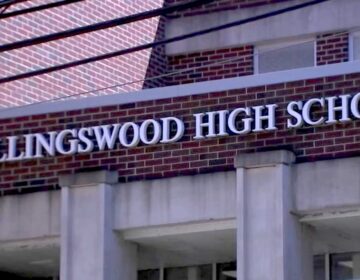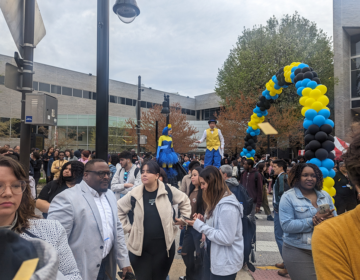Rosemont College slashes tuition sticker price, actual savings may vary

Students, faculty and staff gathered at Rosemont College learned of the 'Our Tuition Promise' initiative in which tuition will be reduced by 43 percent starting next year (Courtesy of Rosemont College)
College tuition prices continue to steadily rise faster than just about anything. Running against that trend, Rosemont College has decided to drastically cut its tuition.
The private, Catholic college announced it will reduce tuition by 43 percent beginning next year. Undergraduate tuition is currently $32,620 and will drop to $18,500.
Students, faculty and staff at Rosemont gathered on campus yesterday to learn about the initiative called Our Tuition Promise.
Richard Geschke, chair of the board of trustees, joked and told the crowd that “I am not here to tell you that the pope is coming to Rosemont,” before introducing college president Sharon Hirsh for the major announcement.
Hirsh said there were two reasons for the initiative.
“First, we want families to understand that they can afford a Rosemont education,” she said. “Right now, we know that many, many, many families cross Rosemont off their list as soon as they see our current published tuition price.”
Besides trying to appeal to more families, she says the other reason is the current college pricing model is “frankly broken.”
“We’ve all been caught in an ever continuously escalating cycle of rising tuition and rising discounts,” she said. “We are no longer playing this game.”
She says tuition at most private colleges is actually an “artificial sticker price” and the majority of students end up paying a “discount” in the form of grants and scholarships.
“Not many people understand that the college published sticker price is one that college students never end up paying,” Hirsh said.
She said, across the country, 89 percent of first-year students pay a “discounted price” at four-year private colleges and their average discount is 48 percent. That means the majority of students are paying almost half the advertised price.
“We are promising that we will make our sticker price the true tuition price so you know what you’re dealing with,” she said.
She pointed out financial aid and merit scholarships will still be available to students and noted that 80 percent of their aid is need-based aid rather than merit aid.
Room and board saw a 14 percent reduction, as well, from $13,400 to $11,500.
Hirsh says students will see savings from $100 to several thousands of dollars, with an average savings of about $800. Each current student received a customized packet outlining next year’s individual funding package.
The tuition reduction will apply to incoming freshmen and all existing undergraduates — approximately 600 students. The new tuition model is expected to continue in future years with only increases anticipated for inflation.
Several colleges across the country have enacted similar tuition models, but Hirsh says Rosemont is the first college in the Philadelphia area to reset tuition so significantly.
She hopes this will allow conversations with prospective students to be less about financial aid and more focused on degree programs and the school itself.
The college’s board of trustees unanimously voted in June, after studying the issue for several years.
One key part of their research was a Sallie Mae study that found more than half of all families eliminate colleges based on cost alone or the “sticker price.”
“Because we’re small, we’re able to be nimble,” Geschke, the board chair said in a statement. “We’re doing this not because we have to, but because we can.”
They did not cut any programs to afford the tuition reduction.
Hirsh says 70 percent of their revenue comes from tuition, but the college also relies on its endowment and alumni giving.
This isn’t the first major change at the school under Hirsh’s leadership. She helped the former women’s college to become co-educational in 2009.
WHYY is your source for fact-based, in-depth journalism and information. As a nonprofit organization, we rely on financial support from readers like you. Please give today.




